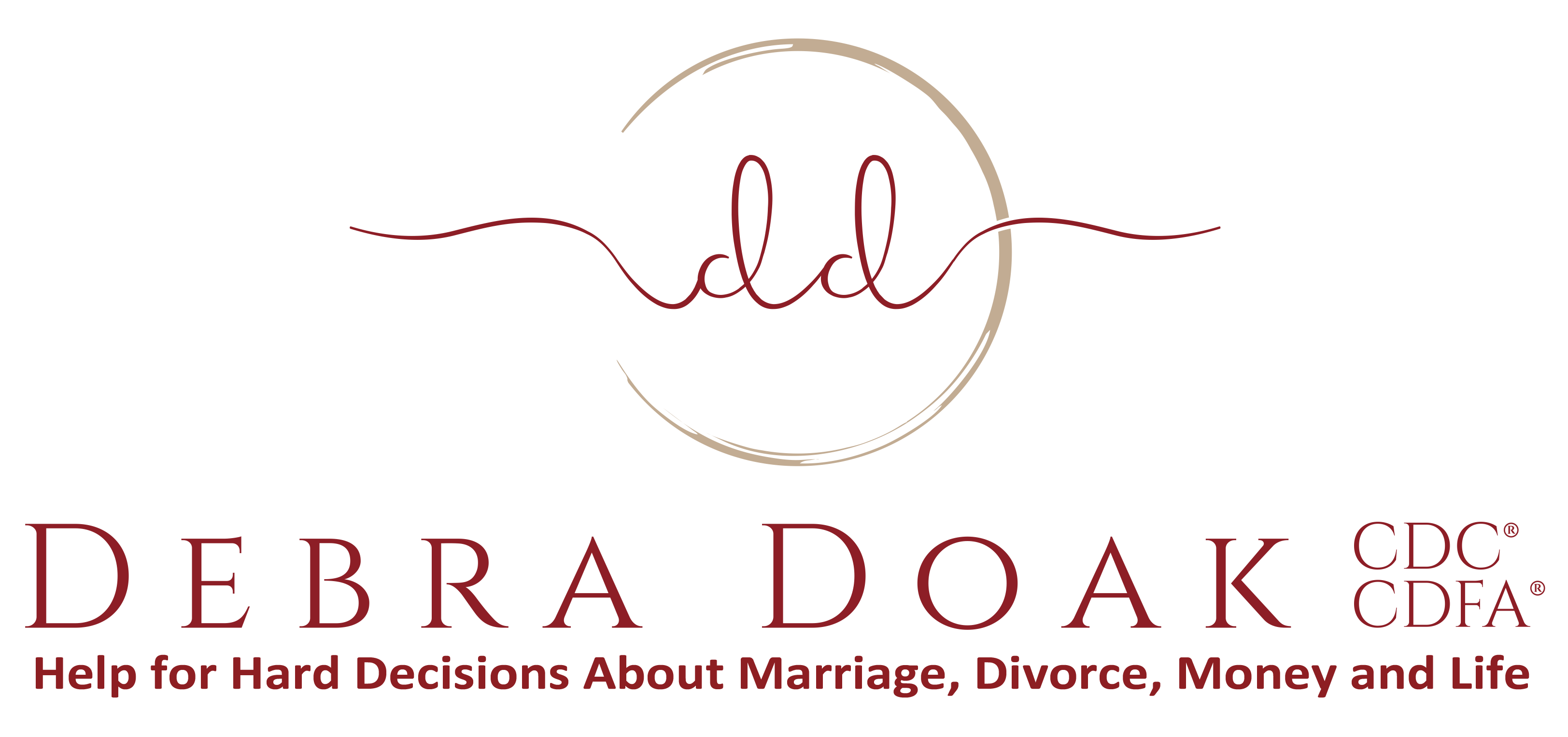
4 Reasons to Stay Out of Divorce Court
We’ll see what the judge has to say about that – I’ll see you in divorce court! If you listen to the media, you might get the idea that most divorcing couples end up in court having a judge decide the outcome of their case. But the reality is that only 3-5% of cases actually go to trial – almost everyone is able to negotiate some sort of settlement agreement without the courtroom drama.
And that’s great news because “having your day in court” in no way resembles television and it takes a big toll on everyone involved. Now, there are certainly some instances where you need the power of the court. If you or your children are in danger, large sums of money are missing, or your spouse is simply refusing to participate. But let’s review the 4 big reasons it’s in your best interest to stay away from litigation and out of divorce court when it comes to ending your marriage.
Money
One thing I always ask clients to consider is their divorce budget. If you think you’ve spent a lot on mediation or legal fees so far, try going to trial – it is EXPENSIVE. You’ll pay your attorney for hours of their time to get ready for trial, create a trial notebook with exhibits, confer with opposing counsel, and meet with you to strategize and prepare for being on the witness stand. Then you’ll pay their time and costs to travel to divorce court, wait around to be called in, and participate in the actual proceedings. We’re talking $10, $20, or $50,000 depending on the complexity of your case.
This is the time to ask yourself if you are stepping over dollars to pick up pennies. Will you have to hire a forensic accountant or custody evaluator to support your argument? How much will those experts cost? (hint: tens of thousands) What are the chances that spending this money will improve your chances of getting the outcome you’re hoping for? What else could that money be used for that you are giving up to go to trial? A downpayment on a house, a couple of years of college for your child, or a new car? Consider the opportunity cost of those dollars and the financial position you might find yourself in if you rack up a $50,000 or $100,000 legal bill.
Escalated Conflict
Most states now require mediation and a series of hearings or settlement conferences before a case can go to trial. That’s because they understand that the court system is set up to have a winner and a loser. The harder each side fights to win, the more adversarial the relationship becomes and the more conflict escalates. Experts assert that escalation is the most destructive force on the planet and conflict escalation causes people to do all sorts of terrible, hateful things that they would ordinarily not consider doing.
In his book Splitting: Protecting Yourself While Divorcing Someone with Borderline or Narcissistic Personality Disorder, Bill Eddy strongly recommends considering alternatives to litigation when divorcing a high conflict person (HCP). Because HCP’s love conflict, love a battle, and will do anything to win no matter the cost, conflict (and expenses) can spiral out of control. Once the court system is involved, an HCP will continue to make accusations, file motions, and argue for years.
Emotional Strain
Family court systems move VERY slowly and their caseload is heavy. It could take you months or even a year to get a trial date. And once you do get a date on the court’s calendar, it might get bumped. Opposing counsel could ask for a continuance or the court may have more pressing matters come up. Then what? More delays, more frustration, and more time off work or canceled plans. Is putting your mental health at risk and your future on hold worth the potential gain?
All the money and time I mentioned above…those will be weighing on you while you wait for your case to be heard. Not to mention how stressful it is to actually go to trial, be cross-examined, and have your every move as a parent or every word you wrote in email, text or on social media put under a microscope. I imagine you’ve heard the horror stories of divorces that took 3 years or more to get finalized. That kind of experience is difficult to recover from both financially and emotionally.
And the #1 Reason: Outcome
In my experience, most (certainly not all) people who decide to litigate their cases get an outcome that is very similar to or worse than an offer that was on the table previously. Why is that? At a high level, it typically involves getting attached to a result that is not based on the legal statutes, but rooted in some sort of emotional justice or sense of “fairness”. For example, if the court tends toward a relatively equal parenting time schedule, but the stay-at-home parent refuses to accept that. Or if one spouse cheated and the other believes they should be compensated for that despite it being a no-fault divorce state.
Those who work in the divorce space say “FAIR” is the F word. Some of the realities of divorce just don’t feel fair to one party or the other and going to divorce court won’t change that. Read more here about some of those issues. Ask your attorney plenty of questions about potential outcomes and thoroughly examine your BATNA (best alternative to a negotiated agreement). Rely on their advice, not your feelings, before making any decisions about going to trial.
Final Thoughts About Divorce Court
As much as you think having your day in court might feel satisfying, chances are it won’t. Frankly, the judge probably won’t care (and may not even want to hear) that your spouse had an affair. And when it comes to parenting, the standard that you think is “best” for the children could be well above what the court deems acceptable. Remember, they deal with a lot of deadbeats, so if your spouse has a job, shows up showered and sober, and wants to spend time with their kids, they’re a superhero. The fact that he/she parents differently than you do (is more of a disciplinarian, gives them unlimited screen time, skips church, serves fast food, doesn’t enforce bedtimes) may have no impact.
This is where working with a divorce coach can be really useful. We can help you prioritize some of these big issues, reality test expectations, and consider the financial and emotional impact of decisions. At the end of the day, it’s your divorce and your choice to negotiate an agreement or go to divorce court. Sometimes it’s just nice to have an experienced thinking partner to walk through it with you.
Wishing you strength and wisdom,




